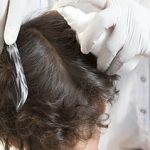Head lice are ubiquitous still, so there’s a good chance your son or daughter could develop an infestation. Now, the nation’s leading pediatrics group is issuing new guidelines to help schools and families cope.
The American Academy of Pediatrics (AAP) is emphasizing education to reduce stigma and manage infestations. The new guidelines are the first on diagnosing and treating head lice since 2015.
“Head lice are an unpleasant part of the human experience, but they can be successfully managed and are no reason for a child to miss school,” said Dr. Dawn Nolt. She is lead author of the guidelines from the AAP Committee on Infectious Diseases, Committee on Practice and Ambulatory Medicine, and Section on Dermatology.
Importantly, the group emphasized, head lice are not a health hazard. They are also not a sign of poor hygiene.
Topical agents — including shampoos, lotions and other U.S. Food and Drug Administration-approved products containing pyrethroids — are typically the first-line treatment for head lice.
The AAP recommends treatments that are safe and age-appropriate. They should be affordable, easy to use and rapidly rid an individual of live lice and nits, the AAP said. Parents are encouraged to call their child’s doctor to be sure they are properly diagnosed and correctly use the products.
The clinical report, “Head Lice” — published online Sept. 26 in the journal Pediatrics — further details alternative treatments if a child or teen has developed resistance to these products.
Programs in schools that have screened for head lice have not had a significant effect, the AAP said. They also may stigmatize children suspected of having the bugs. The AAP suggests schools instead offer educational programs for families to help increase understanding and management of head lice in the community.
“The AAP encourages pediatricians to serve as an educational resource for families, school districts and communities so that head lice may be treated and managed without stigma,” Nolt said in an academy news release.
For parents, more information is available on HealthyChildren.org.
More information
The U.S. Centers for Disease Control and Prevention has more on head lice.
SOURCE: American Academy of Pediatrics, news release, Sept. 26, 2022
Source: HealthDay
Copyright © 2026 HealthDay. All rights reserved.
















